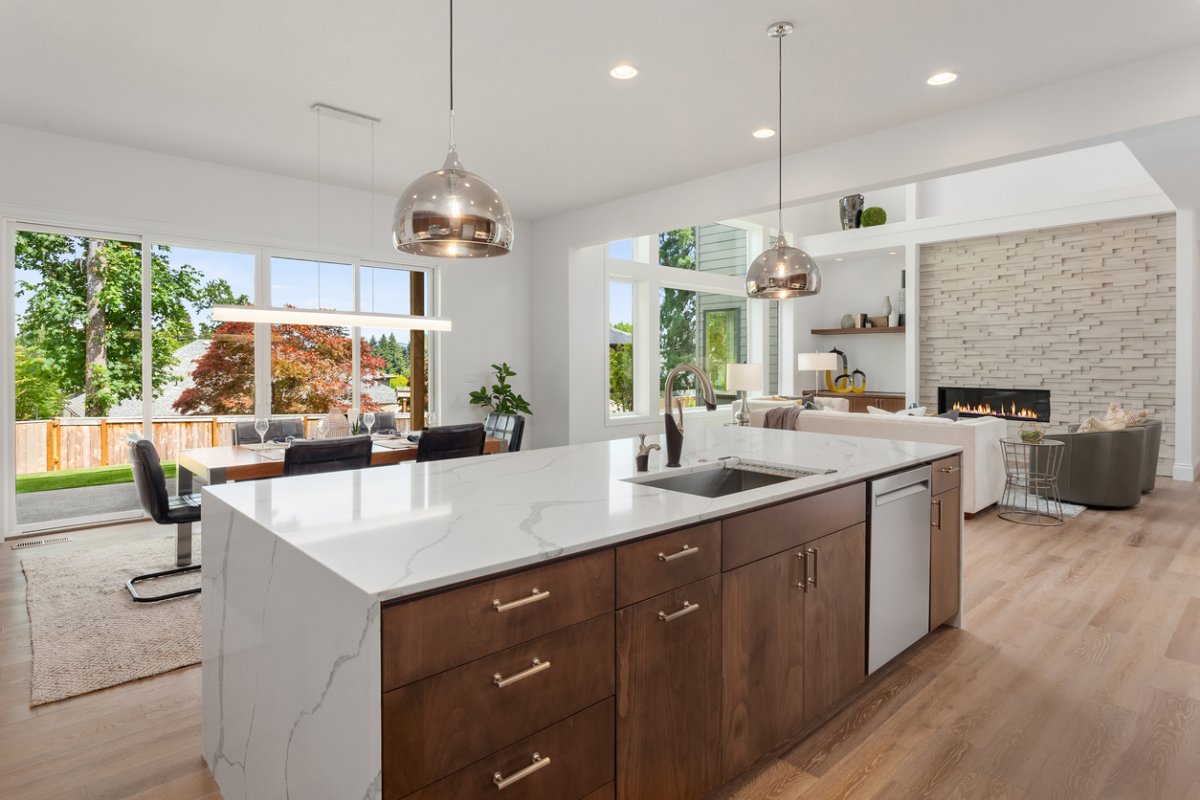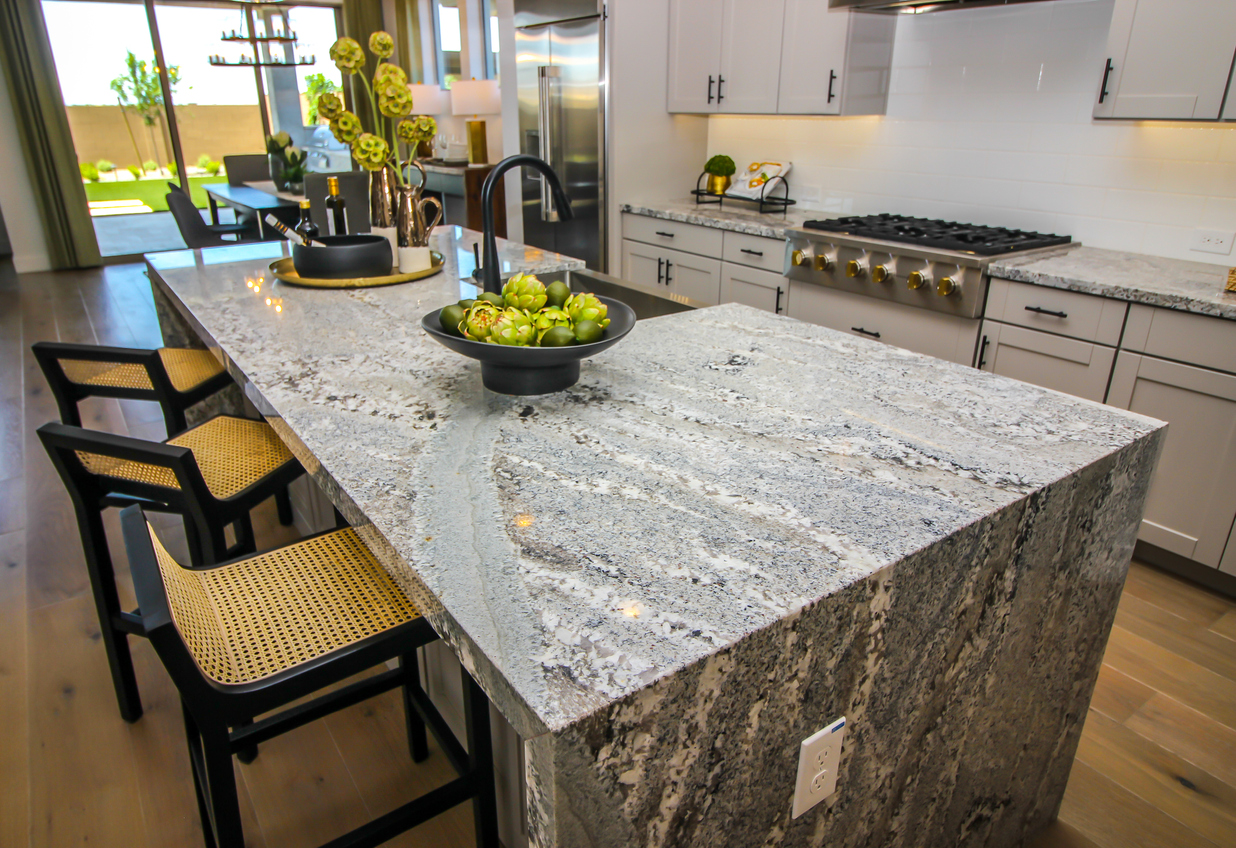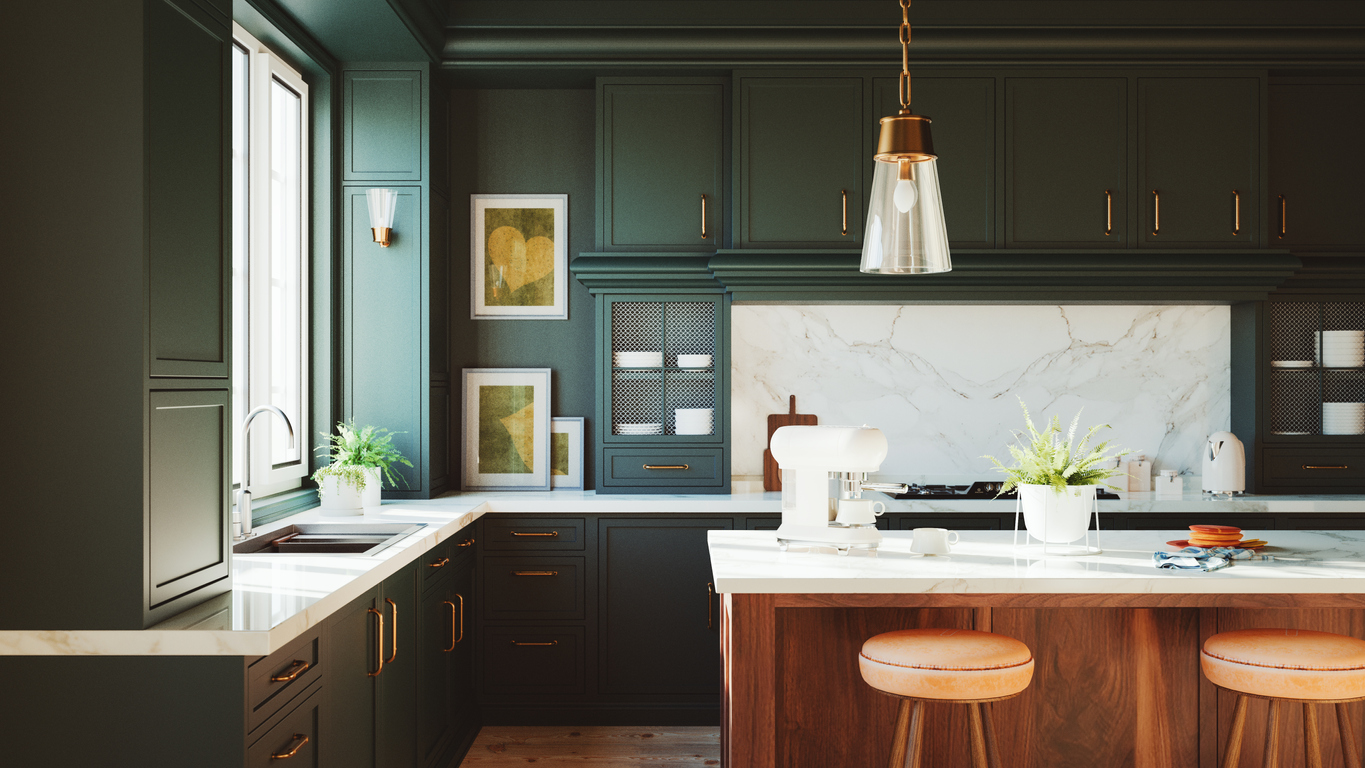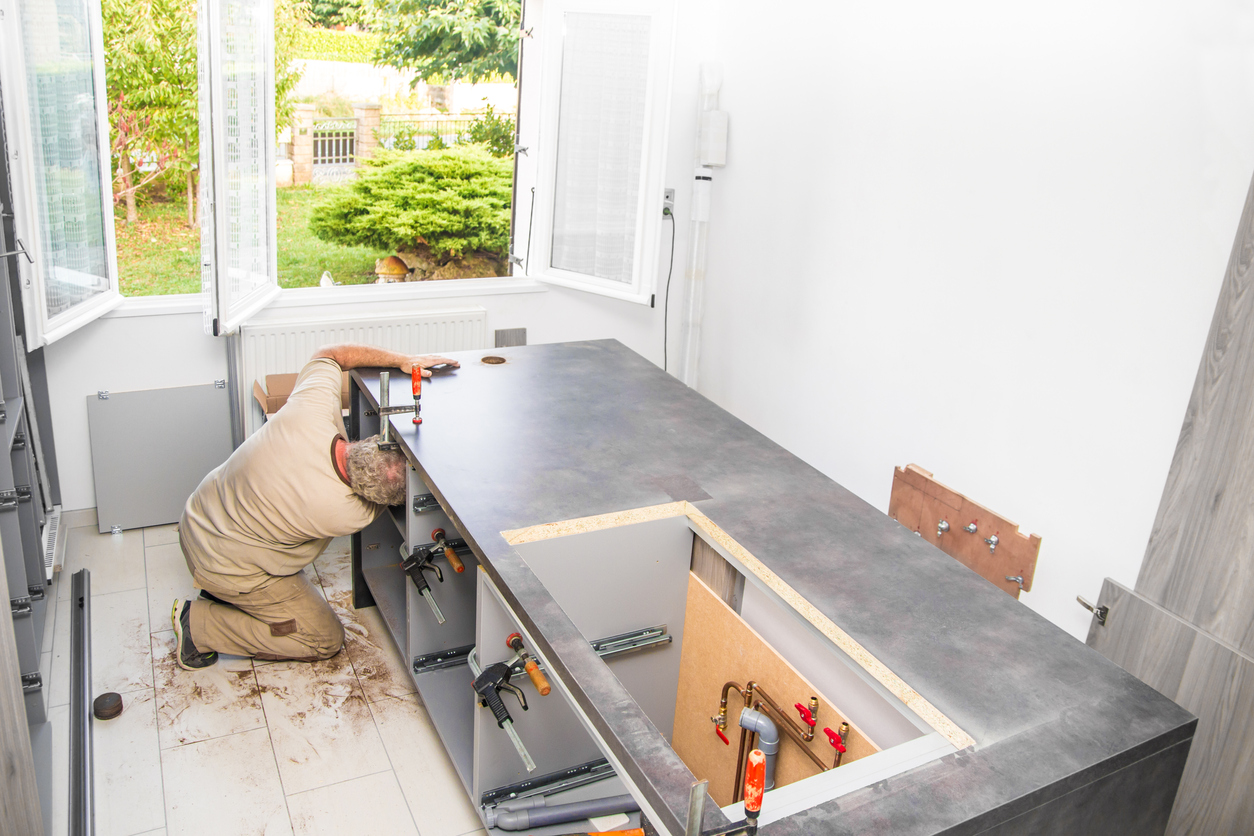

We may earn revenue from the products available on this page and participate in affiliate programs. Learn More ›
Q: My current kitchen doesn’t have an island, and I’d really like to incorporate one. I’m pretty handy, but I’m not sure if I have the skills to DIY this type of project. Is it cheaper to buy or build a kitchen island?
A: Islands are a valuable addition to a kitchen and can come in a wide variety of shapes, sizes, and styles. The least expensive option homeowners have when it comes to kitchen islands is to build one themselves, so long as they have the necessary tools and time to dedicate to the project. However, a DIY kitchen island is also likely to be less versatile when it comes to the materials it’s built out of and what appliances or utilities it can accommodate. For those who are not experienced DIYers, there are plenty of functional kitchen islands that can be purchased premade. For those with a bigger budget, hiring a carpenter or a contractor to make an island from scratch can yield a beautiful and custom result. Whichever option a homeowner chooses, kitchen islands are a favorite because of their versatility and ability to add efficiency that makes everyday meals with the family or entertaining a crowd a breeze.
Prefab vs. Semi-Custom vs. Custom Kitchen Islands
When homeowners are looking into adding a kitchen island, there are generally three options: prefab, semi-custom, and custom. A prefab kitchen island is already made and doesn’t offer many customization options aside from changing the hardware or painting over the cabinets. Some prefab islands are simply tables or rolling carts that are not permanently installed. A semi-custom island has fewer bells and whistles than a fully custom island, but it can be altered based on a homeowner’s requirements for how it’s configured. A fully custom island can be built from scratch based on the unique requirements of the kitchen and the homeowner’s kitchen island ideas. Custom kitchen islands may even include features such as appliances, sinks, cooktops, or electrical outlets.
| Type of Island | Type of Installation | Customization |
| Prefab | May come preassembled or require assembly, and can be permanent or mobile | Little to none |
| Semi-custom | Sold and installed by linear square foot | Can change doors, colors, drawer size, and configuration |
| Custom | Installed by a professional | Endless customization options available |

In many cases, it will be cheaper to purchase a prefabricated kitchen island than to have one custom built. One reason for this is the higher labor cost associated with building the unit from scratch.
The cost to build a kitchen island can range between $100 to $10,000 depending on the size, material, and any special features that are included. That cost will be closer to $3,000 to $10,000, or more if it includes top-of-the-line materials and features that require plumbing and electricity. The reason for this high price is the additional labor cost of building the island. Depending on the project, there may also be a design fee for planning the build.
Alternatively, prefabricated (or stock) kitchen islands come ready to be installed in a home’s kitchen and typically cost between $150 and $2,000. Larger islands with marble countertops will fall on the higher end of the spectrum, while small rolling or portable islands built from lumber and with wood countertops or butcher block are some of the cheapest options to purchase prefabricated. For those who simply need a bit of extra counter space, there are plenty of simple kitchen islands for under $500 that will do the trick. Because stock kitchen islands are mass-produced, homeowners will only need to pay for the island itself and the cost of installation if it is a permanent fixture.
Custom kitchen islands also typically have more special features such as appliances and electrical outlets, which can further increase their cost.
For those who decide to invest in a custom kitchen island, the options are almost endless in terms of what can be incorporated. Custom islands can accommodate a wide range of appliances, from vintage options with unique designs to modern kitchen islands with sleek cabinetry and high-tech features. Working with a carpenter can allow homeowners to optimize their kitchen island and make it as functional as possible. For example, there is some debate about whether it’s better to have a cooktop or a sink on a kitchen island. This depends entirely on a homeowner’s preferences, and with a custom build, they can choose between these features in the way that best suits their needs and budget. While having an island with multiple functions is convenient, each customization will come with a price tag:
| Feature | Cost |
| Added drawers and storage | $6,000 to $30,000 |
| Cooktop | $500 to $1,000 |
| Oven | $750 to $2,700 |
| Dishwasher | $600 to $1,700 |
| Electrical outlets | $150 to $350 a piece |
| Kitchen island lighting | $100 to $300 per light |
| Prep and wash station | $7,000 to $33,000 |
| Seating | $6,500 to $31,000 |
Many prefabricated kitchen islands come in a standard rectangular shape. If a different style is desired, homeowners may want to opt for a more costly custom model.
The downside to buying a pre-built kitchen island is that these units are restricted to a standard shape. Although these have a lower cost up front, they generally won’t be customizable, which may be important if the kitchen is a unique style or size that requires a more specific shape. Homeowners who want more say in what their kitchen island looks like or what features are included may want to consider saving up for a custom piece that a carpenter can create based on these specifications.
While rectangular kitchen islands are the most common type of prefabricated option, rolling cart islands and galley islands are also available to purchase premade. L-shaped and U-shaped islands, however, are less common and will cost more because they will likely need to be custom built and professionally installed.
Similarly, if it isn’t possible to find a prefabricated island in a size that suits the kitchen, it may be necessary to build a custom one.
Even the smallest kitchens can typically accommodate a kitchen island. However, if the kitchen is smaller than 13 feet in width, it may not be possible to find a prefabricated island that is small enough for the space. In this case, a custom island can be made to fit the kitchen.

The ideal size for a kitchen island is less about the specific measurements and more about how much room is left for people to move around it. The standard size for a kitchen island is a minimum of 4 feet by 2 feet with a height of 36 inches. If the island is going to be used for dining purposes, it may make sense to have it built to a height of 42 inches.
If the kitchen island is being installed as part of a kitchen remodel project, it’s important to plan the space strategically so that there is still plenty of space to move around. When looking into small kitchen remodel costs, it may be worth seeing if there is room for kitchen design services in the budget. A kitchen designer costs around $65 to $250 per hour and can help optimize the configuration of the space, including the kitchen island size and placement.
It’s worth noting that while custom-built kitchen islands may cost more up front than prefab units, they will typically have a higher return on investment.
Putting thousands of dollars into a custom-built kitchen island can seem scary, but thinking of this project as an investment into the home and its future value might make the splurge seem more practical. A kitchen island can add a lot of value to a home, especially when it comes to resale. While a prefabricated piece is better than no kitchen island at all, islands that have been designed with the style and layout of the kitchen in mind are more desirable both aesthetically and functionally, which can make the home more appealing to buyers. Since custom islands have a better return on investment, this can justify their higher cost for homeowners who will be putting their homes on the market soon. Even for homeowners who don’t plan on moving or selling their home in the near future, building a kitchen island with cabinets or one with the best countertop material comes with the benefits of making working in the kitchen feel like less of a chore.
Purchasing a semi-custom prefabricated island can allow homeowners to choose the features they want without paying the high cost of a fully custom unit.
Hiring a professional to build a fully custom island from scratch will have the highest price tag due to the labor it requires to complete the project. For homeowners who want to have some say in what features are included in their island without the higher cost, buying a kitchen island with semi-customizable features is a great option to consider. Semi-customizable islands can be a great compromise, as they have only a slightly higher cost than prefab islands but can be made to blend in more naturally with the look of the kitchen. Manufacturers that offer semi-custom kitchen islands typically allow customers to choose the base model they like, and then select the kitchen island size, cabinet style, countertop material, and paint colors that best suit their space and preferences. This way if a homeowner wants to splurge on an important feature, such as high-end countertops, they can do so without breaking the bank on a fully custom piece. The island is then delivered to the home and may arrive in one piece or require some assembly.

For ambitious DIYers, building a kitchen island from scratch may cost less than buying a prefab unit, but it will be important to factor in the cost of tools and materials.
When looking to save on kitchen remodel costs, many resourceful homeowners consider saving on labor by doing some of the work themselves. For homeowners who are handy and have the time and energy it takes to build an island, it’s a DIY that can probably be tackled. For those who don’t know how to build a kitchen island, a simple model is probably doable with the right tools and materials. If the kitchen is small, building an island could be a good solution since it can be made in a size that makes the most impact in the space. When it’s all said and done, even a small or portable kitchen island is beneficial for a kitchen with less square footage.
However, it’s important to note that it will take heavy-duty tools like a table saw to create a DIY kitchen island out of lumber and plywood. If these tools are not already owned, the cost to rent or purchase them may cancel out any potential savings on labor. Professionals will also be able to deliver the finished product in a much shorter time frame, which may be a consideration if the project is part of a larger kitchen remodel.
Whichever option a homeowner chooses, a kitchen remodeling contractor can build a custom kitchen island or install an existing unit.
Whether a homeowner is buying a pre-built island or having one made, it’s a good idea to have a professional secure it in place so that it’s exactly where it needs to be in the kitchen. If the entire kitchen is being remodeled, contractors will also know which stage of the project is the best time for installing the island so that the rest of the renovation is not disrupted. One of the top kitchen remodeling companies will be able to provide an idea of what installation would entail and provide an estimate for how much it will cost depending on the label it will require. A contractor will likely measure the island, lay cleats on the floor, level the cabinets, and attach the base of the island to the cleats. Depending on the size of the island, it will likely take about 1 to 3 hours to complete. If the kitchen remodeling company builds a custom island, installation and labor may be included in the total cost of the project.
If the kitchen island needs any utility hookups, this part of the installation will need to be handled by a licensed professional.
From microwaves to dishwashers, wine fridges, or cooktops, there are many different appliances or utilities that can appear on a kitchen island. To ensure that the installation is done safely, homeowners will need to enlist the help of appropriately licensed professionals. For islands with electrical components, it’s a good idea for a homeowner to reach out to an electrician near them to help set up the hookups and make sure everything is wired and installed correctly. Sinks, dishwashers, and stoves will require the help of a plumber to run water and gas lines to the island. Running new electrical or gas lines may also require special permits, so professionals will be able to help ensure that the project is up to code.
